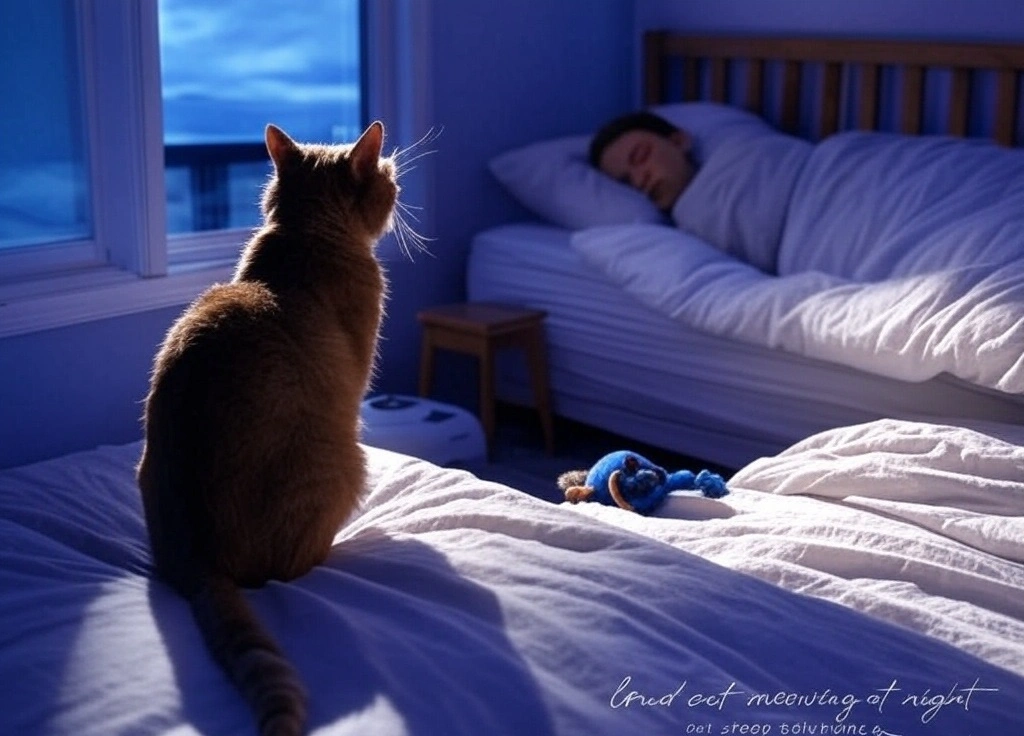If you’re a cat owner, you’ve likely experienced the frustration of being woken up by loud cat meowing at night. That piercing sound echoing through your home at 3 a.m. can turn a peaceful night’s sleep into a distant dream. Cats are naturally vocal creatures, but when their meows become excessive or disruptive, it’s a sign that something needs attention. Whether it’s hunger, boredom, or an underlying health issue, understanding why your cat is making noise is the first step to finding a solution. In this detailed guide, we’ll explore the reasons behind feline vocalization at night, offer practical strategies to stop cat meowing, and recommend tools to restore harmony to your household.

keyword:
loud cat meowing at night
stop cat meowing
cat behavior at night
feline vocalization
cat sleep solutions
Why Do Cats Meow Loudly at Night?
Cats aren’t just being difficult when they meow at night—they’re communicating. To effectively deal with loud cat meowing at night, you need to decode what your feline friend is trying to tell you. Cats are crepuscular, meaning they’re most active during dawn and dusk. This natural rhythm often clashes with our human sleep schedules, leading to nighttime disruptions. Here are some common reasons your cat might be raising the roof after dark:
1. Hunger or Thirst
One of the simplest explanations for loud cat meowing at night is an empty stomach or dry water bowl. If your cat’s last meal was hours ago, they might be signaling it’s time for a midnight snack. Cats are creatures of habit, and a disruption in their feeding routine can prompt vocal protests. Similarly, a lack of fresh water can lead to restlessness and meowing as they try to get your attention.
2. Boredom or Lack of Stimulation
Cats are hunters by nature, and without enough activity during the day, they’ll turn to nighttime antics to burn off energy. If your cat hasn’t had enough playtime or mental stimulation, cat behavior at night can include relentless meowing, pacing, or even knocking things off shelves. A bored cat is a noisy cat, and they’ll let you know they’re ready for action when you’re ready for sleep.
3. Seeking Attention
Some cats meow simply because they crave your company. If you’ve been away all day or busy with other tasks, your cat might use feline vocalization to demand interaction. This attention-seeking behavior can intensify at night when the house is quiet, and they know you’re more likely to respond.
4. Health Issues
Sudden or excessive loud cat meowing at night could indicate a medical problem. Conditions like hyperthyroidism, kidney disease, or urinary tract issues can make cats uncomfortable, leading to vocalization as a cry for help. Older cats might also experience cognitive dysfunction, similar to dementia in humans, causing confusion and nighttime yowling.
5. Environmental Changes
Cats are sensitive to their surroundings. A new pet, a move to a new home, or even rearranged furniture can unsettle them, triggering cat behavior at night that includes loud meows. They might be expressing anxiety or trying to reassert control over their territory.
6. Mating Instincts
If your cat isn’t spayed or neutered, their meowing could be linked to hormonal urges. Female cats in heat or males detecting a nearby female can become extremely vocal, especially at night when they’re most active. This is often accompanied by yowling—a deeper, more insistent sound than a typical meow.
Practical Solutions to Stop Loud Cat Meowing at Night
Now that you understand the “why” behind loud cat meowing at night, let’s dive into the “how” of stopping it. These actionable tips will help you address the root causes and create a quieter, more restful environment for both you and your cat.
1. Establish a Consistent Feeding Schedule
To prevent hunger-driven meows, adjust your cat’s feeding times. Offer a small meal or snack closer to bedtime—say, around 9 or 10 p.m.—to keep their tummy full through the night. Make sure their water bowl is clean and filled, too. A hydrated cat is less likely to wake you up complaining. If you’re struggling to maintain a routine, consider an automatic feeder like the PETLIBRO Automatic Cat Feeder. It dispenses food at set times, ensuring your cat stays satisfied even when you’re asleep.
2. Boost Daytime Activity
A tired cat is a quiet cat. Increase playtime during the day with toys like feather wands, laser pointers, or interactive puzzles. Aim for at least 20–30 minutes of vigorous activity in the evening to tire them out before bed. This mimics their natural hunting instincts and reduces cat behavior at night that disrupts your sleep. For an extra boost, try a Catit Senses Circuit Toy, which keeps cats engaged with minimal effort on your part.
3. Ignore Attention-Seeking Meows
It’s tempting to respond when your cat meows, but giving in reinforces the behavior. If you’ve ruled out hunger or health issues, try ignoring the noise. Use earplugs or a white noise machine for the first few nights—it might get worse before it gets better, but consistency is key. Over time, your cat will learn that meowing doesn’t yield results, reducing feline vocalization at night.
4. Visit the Vet
If the meowing is new, persistent, or paired with other symptoms (e.g., weight loss, increased thirst, or lethargy), schedule a vet checkup. Early detection of health issues like hyperthyroidism or urinary problems can stop loud cat meowing at night and improve your cat’s quality of life. Don’t delay—cats are masters at hiding pain, and vocalization might be their only clue.
5. Create a Calming Sleep Environment
Help your cat feel secure at night by setting up a cozy sleep spot. A soft bed in a quiet corner, away from windows or noisy appliances, can work wonders. Add a pheromone diffuser like Feliway to reduce stress and encourage relaxation. These small changes can minimize cat sleep solutions challenges and keep your cat content through the night.
6. Spay or Neuter Your Cat
For unaltered cats, spaying or neutering is a game-changer. It eliminates mating-related yowling and reduces overall restlessness. Most vets recommend this procedure around 4–6 months of age, but it’s never too late to discuss with your vet. This simple step can drastically cut down on loud cat meowing at night.

Understanding Your Cat’s Unique Needs
Every cat is different, and what works for one might not work for another. Pay attention to your cat’s personality and habits. A chatty Siamese might need more interaction than a laid-back tabby. An older cat might require extra comfort due to arthritis or vision loss. Tailoring your approach to their specific needs is the secret to mastering cat sleep solutions and ending nighttime noise.
The Science Behind Feline Vocalization
Research sheds light on why cats meow and how we can address it. A 2015 study in the Journal of Veterinary Behavior found that cats use vocalization primarily to communicate with humans, not other cats (Cornell Feline Health Center, 2015). Kittens meow to their mothers, but adult cats reserve it for us—pretty clever, right? Another study from the Journal of Feline Medicine and Surgery (2018) linked excessive vocalization in senior cats to cognitive dysfunction, highlighting the importance of vet care for aging felines. Understanding this science helps us tackle feline vocalization with empathy and precision.

Real-Life Stories: Cat Owners Share Their Solutions
Sometimes, hearing from fellow cat owners can spark inspiration. Take Sarah from Seattle, who dealt with her tabby’s loud cat meowing at night by adding a pre-bedtime play session. “After 20 minutes chasing a laser pointer, she’s out like a light,” Sarah says. Then there’s Mark from Chicago, whose senior cat’s yowling stopped after a vet diagnosed hyperthyroidism. “Medication made all the difference,” he notes. These stories show that with patience and the right strategy, you can find peace again.
Watch and Learn: Educational Video
For a visual guide, check out this helpful video from a trusted veterinarian. It breaks down why cats meow at night and offers step-by-step tips to stop it.
(FAQ)
1. Why does my cat meow so loudly at night?
Your cat might be hungry, bored, or seeking attention. Health issues like hyperthyroidism or stress from environmental changes could also trigger loud cat meowing at night. Observe their behavior and consult a vet if it persists.
2. How can I stop my cat from meowing at night?
Try feeding them before bed, increasing daytime play, and ignoring attention-seeking meows. Tools like the PETLIBRO Automatic Cat Feeder can help maintain a consistent schedule to stop cat meowing.
3. Is loud meowing a sign of a health problem?
It can be. Conditions like kidney disease or urinary issues often cause feline vocalization as a distress signal. A vet visit is essential to rule out medical causes.
4. Does playing with my cat help with nighttime noise?
Yes! Engaging your cat in play during the day reduces restlessness and curbs cat behavior at night. Try toys like the Catit Senses Circuit Toy for extra fun.
5. Can spaying/neutering stop nighttime meowing?
Absolutely. Unaltered cats meow due to mating instincts, and spaying or neutering eliminates this, reducing loud cat meowing at night significantly.
6. Why does my older cat meow more at night?
Senior cats may experience cognitive dysfunction or discomfort from age-related issues like arthritis, leading to increased feline vocalization. A vet can suggest treatments or comforts like nightlights.
7. How long will it take to stop my cat’s nighttime meowing?
It varies. Behavioral changes might take a few days to weeks with consistency, while health-related meows need vet intervention. Patience is key to finding effective cat sleep solutions.
Final Thoughts on Managing Loud Cat Meowing at Night
Dealing with loud cat meowing at night can test your patience, but it’s a solvable problem. By addressing hunger, boosting activity, and ensuring your cat’s health and comfort, you can reclaim your nights. Cats meow for a reason, and with the right approach, you’ll turn those midnight serenades into peaceful purrs. Experiment with these tips, consult your vet when needed, and invest in tools like automatic feeders or interactive toys to make the process smoother. Sweet dreams—for both you and your feline companion—are just a few steps away.
References:
Cornell Feline Health Center. (2015). “Feline Behavior Problems: Vocalization.” Cornell University College of Veterinary Medicine.
Click here for Cornell Feline Health Center
Bradshaw, J. W. S. (2018). “The Behaviour of the Domestic Cat.” Journal of Feline Medicine and Surgery, 20(3), 189–197.
Click here for Journal of Feline Medicine and Surgery (Note: Full access may require a subscription)
Ellis, S. L. H., et al. (2015). “Environmental Enrichment: Practical Strategies for Improving Feline Welfare.” Journal of Veterinary Behavior, 10(5), 321–329.
Click here for Journal of Veterinary Behavior (Note: Full access may require a subscription)
